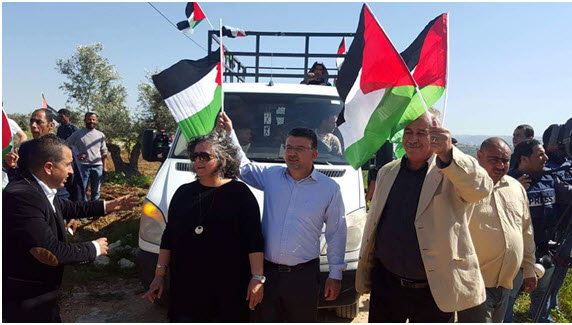Hundreds of protesters gathered in the West Bank village of Bil’in on Friday, February 19, to mark 11 years of weekly demonstrations against the Israeli’s security barrier and occupation. Following afternoon prayers, the protesters marched along the same route that has been followed every Friday since 2005 — from the center of the village to the separation wall, which is built on village land. Hadash Members of Knesset Aida Touma-Suleiman and Yousef Jabareen of the Joint List took part in the march, along with former Hadash MK Muhammad Barakeh, today chairman of the Arab High Monitoring Committee in Israel. Several Palestinian political leaders, members of the Central Committee of the Fatah Movement, the Communist Palestinian People’s Party and members of the Palestinian Detainees’ Committee also joined the procession.

Hadash Members of Knesset Aida Touma-Suleiman and Yousef Jabareen from the Joint List taking part in the Bil’in march, Friday, February 19, 2016, along with former Hadash MK Muhammad Barakeh (Photo: Hadash)
The Popular Committee against the Wall and Settlements in Bil’in issued a statement in which it said “residents, Israeli and international peace activists marched from the center of the village, marking the eleventh anniversary of ongoing popular, nonviolent struggle against the construction of the illegal Wall, colonies and the escalating Israeli violations.”
As is regular every Friday, Israeli soldiers fired scores of gas bombs, concussion grenades and rubber-coated steel bullets at the protesters, causing dozens of protestors to suffer the effects of tear gas inhalation. The marchers carried Palestinian flags and chanted against the illegal Israeli occupation, ongoing and escalating violations against the Palestinians and their homes and lands, and called for the release of hunger-striking detainee, journalist Muhammad Al-Qiq, who is facing a life-threatening condition as he continues his strike, demanding an end to his arbitrary Administrative Detention without charges.
In 2005, the local council of Bil’in, in conjunction with Israeli human rights organization, filed a petition against the construction of the barrier through their village. Two years later, Israel’s Supreme Court ruled that the route of the barrier was illegal and should be moved. The decision effectively won the village back around 650 dunams of land from the initial loss of 1,950 dunams. The barrier was only moved in 2011, and even then around 1,300 dunams of Bil’in’s land was left behind the barrier today, on the side of the Israeli settlements. Nevertheless, the decision was perceived as a victory of sorts for the villagers.
During the years, two of the village’s residents have been killed in the weekly demonstrations. In April 2009, Bassem Abu Rahmah was killed after he was shot in the chest directly with a tear-gas canister. Jawaher Abu Rahmah, Bassem’s sister, died as a result of tear gas inhalation in 2010. Bassem’s mother, Subhia Abu Rahman, attended Friday’s protest and told Al Jazeera that it was important for Palestinians to continue demanding their rights and the return of their land. “It was so painful to lose two children,” she said. “But they died fighting for their country, and the whole village is proud of them.”
Related:


